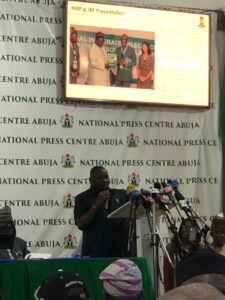The Minister of Power, Adebayo Adelabu, has reaffirmed the ministry’s dedication to providing affordable electricity to Nigerians.
He appreciated the efforts of all departments and agencies within the power sector.
He stated that there are currently 33 power generating companies and 27 power plants operating in the country.
According to him, Since assuming office, the ministry has focused on delivering key projects aimed at strengthening the power sector and enhancing electricity supply.
Adelabu highlighted ongoing market liquidity and reforms as critical drivers of growth in the sector.
He noted that the Federal Government has developed an Integrated Electricity Policy to guide stakeholders—including investors and regulators—towards a data-driven approach.

Another major initiative is the Integrated Resource Plan, which emphasizes cost-effective electrification. Both policies aim to improve supply reliability, support SMEs, create jobs, and stimulate the economy.
The minister also mentioned Nigeria’s involvement in the African Energy Compact, spearheaded by the World Bank and the African Development Bank (AfDB).
Under the “Vision 300” initiative, $35 billion from the World Bank and $5 billion from AfDB will support power utilities across Africa, especially in West Africa.
Nigeria is set to benefit significantly, with the potential to provide electricity access to 150 million people, which accounts for 25% of the initiative’s target.
While embracing renewable energy, the Minister emphasised the importance of focusing on reliable energy access across the board.
He revealed that recent tariff reforms have generated over N700 billion in revenue—a 70% increase from Band A customers.
Overall market revenue in 2024 reached N1.7 trillion, a notable improvement.
The creation of the National Independent System Operator marks another milestone, aimed at achieving grid stability and clarity in operations. Regulatory oversight has been delegated to Plateau and Niger States.
The minister reported a record generation of 6,006 megawatts—the highest in Nigeria’s history—with an average daily generation of 5,700 megawatts in 2025, up from previous years.
The Kaduna Power Plant is expected to become operational before year-end, and plans are underway to explore the energy potential of Nigeria’s dams.
He further noted that with the Coastal Highway now in place across coastal states, there’s no excuse not to harness wind energy.
The Minister concluded by calling for private sector investment in the national grid, stating that government alone cannot sustain the sector.





